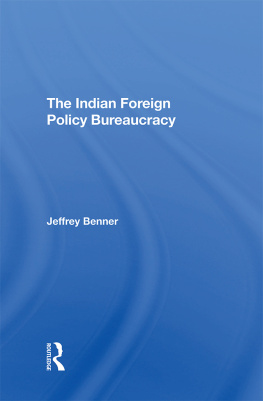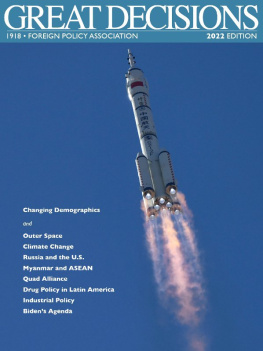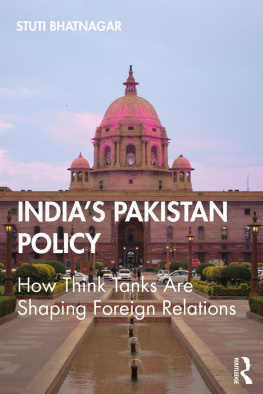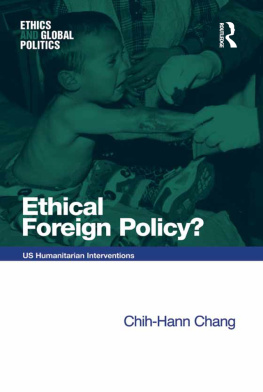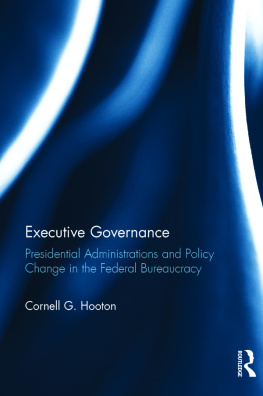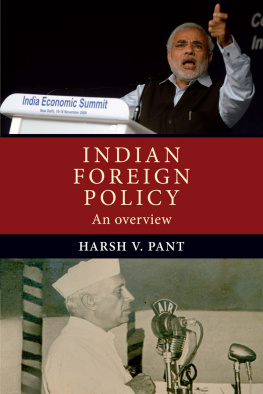The Indian Foreign Policy Bureaucracy
Westview Replica Editions
The concept of Westview Replica Editions is a response to the continuing crisis in academic and informational publishing. Library budgets for books have been severely curtailed. Ever larger portions of general library budgets are being diverted from the purchase of books and used for data banks, computers, micromedia, and other methods of information retrieval. Interlibrary loan structures further reduce the edition sizes required to satisfy the needs of the scholarly community. Economic pressures on the university presses and the few private scholarly publishing companies have severely limited the capacity of the industry to properly serve the academic and research communities. As a result, many manuscripts dealing with important subjects, often representing the highest level of scholarship, are no longer economically viable publishing projects--or, if accepted for publication, are typically subject to lead times ranging from one to three years.
Westview Replica Editions are our practical solution to the problem. We accept a manuscript in camera-ready form, typed according to our specifications, and move it immediately into the production process. As always, the selection criteria include the importance of the subject, the work's contribution to scholarship, and its insight, originality of thought, and excellence of exposition. The responsibility for editing and proofreading lies with the author or sponsoring institution. We prepare chapter headings and display pages, file for copyright, and obtain Library of Congress Cataloging in Publication Data. A detailed manual contains simple instructions for preparing the final typescript, and our editorial staff is always available to answer questions.
The end result is a book printed on acid-free paper and bound in sturdy library-quality soft covers. We manufacture these books ourselves using equipment that does not require a lengthy make-ready process and that allows us to publish first editions of 300 to 600 copies and to reprint even smaller quantities as needed. Thus, we can produce Replica Editions quickly and can keep even very specialized books in print as long as there is a demand for them.
About the Book and Author
In this book, Jeffrey Benner traces the history of the Indian foreign policy bureaucracy from the British period to the present, focusing on the bureaucracy's role in shaping policy. Because the bureaucracy has become an active agent in the policy process, its implementation of policy has often differed significantly from the original policy formulated by top leadership. The book includes a description of the foreign service cadre and a systematic breakdown of the functional and administrative structure of the Ministry of External Affairs, as well as the larger bureaucracy.
Jeffrey Benner is a Ph.D. candidate in political science at the University of Chicago.
To my mother and father for their love and support
The Indian Foreign Policy Bureaucracy
Jeffrey Benner
First published 1985 by Westview Press, Inc.
Published 2019 by Routledge
52 Vanderbilt Avenue, New York, NY 10017
2 Park Square, Milton Park, Abingdon, Oxon OX14 4RN
Routledge is an imprint of the Taylor & Francis Group, an informa business
Copyright 1985 Taylor & Francis
All rights reserved. No part of this book may be reprinted or reproduced or utilised in any form or by any electronic, mechanical, or other means, now known or hereafter invented, including photocopying and recording, or in any information storage or retrieval system, without permission in writing from the publishers.
Notice:
Product or corporate names may be trademarks or registered trademarks, and are used only for identification and explanation without intent to infringe.
Library of Congress Cataloging in Publication Data
Benner, Jeffrey.
The Indian foreign policy bureaucracy.
(Westview replica edition)
1. India--Diplomatic and consular service. 2. India-
Foreign relations administration. I. Title. II. Series.
JX1840.B46 1985 354.540089 84-19569
ISBN 13: 978-0-367-29303-1 (hbk)
This study is one of the administration of Indian foreign policy, but it is something more than that. I have suggested in various places that an analysis of bureaucratic functions can shed some light on Indian foreign policy. However, my early intention to make this chiefly a study of the causality between bureaucratic politics and foreign policy seems now a little ambitious, and so the study as the reader finds it has been scaled down considerably. I hope that the reader forgives me both for not attaining those earlier goals, and for letting the old ambitions remain in several places in the text. This is only a preliminary study, and will be followed by a much more comprehensive treatment of the topic to be published in mid-1988. Then I hope to shift this discussion to a somewhat higher conceptual level, a necessary step if this sort of study is to become useful to the student of foreign policy and not just to the student of administration. This study is a complete revision of my Indian-published book, Structure of Decision.
This study had many contributors, people who went to great troubles to help make this study work. This manuscript was supervised in various stages of its completion by Henry Hart, Bhabani Sen Gupta, and Bernard Cohen. Dr. Sen Gupta especially went far out of his way to help me in my research and the publication of an early draft of this book in India. He exerted a strong conceptual influence on the manuscript's evolution. Neil Richardson aided my research establishment in New Delhi. Joseph Elder gave me much encouragement in the pursuit of the topic, and has helped me in the evolution of the final analytic product. Finally, Lloyd Rudolph assisted me in the history of the Office of the Prime Minister. In the final stages of this manuscript's production these men's assistance has helped turn an assemblage of facts and half-baked ideas into a readable, credible work.
When my research was under way another large group of scholars were with great benefit involved. Marcus Franda and his wife, Vonnie Franda, were indispensable allies in breaking interview ground. I.J. Bahadur Singh, K.P. Misra, Bimal Prasad, Satish Kumar and S.D. Muni were all very helpful in explaining how different aspects of bureaucratic process contribute to final policy. Kuldeep Mathur helped me to locate some research materials that threw much light on the darker corners of the bureaucracy. K. Subrahmanyam consented to a very interesting interview on the subject of political-military coordination. Most of the information on the current bureaucratic environment presented in this study came from interviews with bureaucrats functioning in various positions both within the Ministry of External Affairs and elsewhere in Indian government. Their contribution to this manuscript is quite visible, but they are not mentioned by name to spare them any difficulties.
Others helped in various guises. N. Parameswaran Nair's PhD. dissertation is used heavily in the second chapter of this book, and his work has made much of the historical bent of this study possible. I was unable to contact Dr. Nair about his twenty-year-old research, and hope that he approves the wider propagation (presently only one copy of his work is known to exist) of parts of his very valuable work. J. Bandyopadhyaya and Shashi Tharoor were other scholars of great influence upon this study. Though I have been critical of some of their data and analysis, their excellent studies inspired this author and this book. I express my deep gratitude as well to the staffs of the Indian Council of World Affairs library, Jawaharlal Nehru University library, Benares Hindu University's Centre for the Study of Nepal and the University of Wisconsin's Memorial Library for their excellent research facilities. I also thank the University of Chicago's Computation Center for the use of their text editing and formatting SUPERWYLBUR SCRIPT GML facility. Despite the assistance of the above, errors in fact, of omission, or in interpretation are entirely the responsibility of the author.

